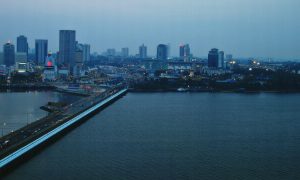Singapore and Malaysia have announced plans to recognize their respective COVID-19 vaccination certificates, part of a broader Southeast Asian effort to revive travel and business as the pandemic wanes.
The announcement was made on Tuesday, following talks between Singaporean Foreign Minister Vivian Balakrishnan, currently on a diplomatic tour of maritime Southeast Asia, and his Malaysian counterpart Hishammuddin Hussein.
A statement issued later by Singapore’s Ministry of Foreign Affairs stated that specific issues – such as the requirements for mutual recognition, health protocols, and application procedures for entry and exit into the two countries – would “be further deliberated and finalized by the two countries.”
The statement also said that the two leaders discussed the political crisis in Myanmar, as well as the Association of Southeast Asian Nations (ASEAN)’s “support for Myanmar’s return to national reconciliation and stability.”
The announcement about vaccine certificates came after the 10-nation ASEAN bloc, of which Singapore and Malaysia are members, pledged to introduce a digital COVID-19 vaccine certificate to help revive the region’s economies. The proposed certificate would resemble the European Union’s embryonic plans for a “digital green pass” that would prove that a traveler has been vaccinated against the coronavirus.
The Southeast Asian bloc did not put a time frame on the creation of a common vaccine certificate, but as Nikkei Asia notes, “reciprocal recognition by Malaysia and Singapore could be a step toward regional certification.”
Singapore and Malaysia are now well into their COVID-19 vaccination campaigns. Singapore had administered 792,423 doses of vaccine as of March 15 (just over 13 percent of its population) while Malaysia had distributed 452,919 as of March 22 (around 1 percent).
Separated by the narrow Johor Strait, Malaysia and Singapore have been closely connected economically since the days of British colonial rule, and remained so even after Singapore was ejected from the Malaysian Federation in 1965.
Prior to the pandemic, more than 300,000 Malaysians crossed the Johor-Singapore Causeway each day, making it one of the busiest overland border crossings in Southeast Asia. Like much else, this daily traffic ground to a halt due to COVID-19 year, depriving Malaysians of employment opportunities in Singapore and Singaporean firms of a cheap source of labor.
Southeast Asia, like much of the world, has been hit hard by COVID-19. Every economy in the region bar that of Vietnam contracted in 2020, led by a whopping 9.5 percent drop in the Philippines and 6.1 percent in Thailand. In particular, the region’s tourist industry was gutted by the travel bans imposed due to COVID-19, impacting the economic livelihoods of hundreds of thousands.
As these numbers continue to creep upward, the restoration of intra-regional travel via a common vaccine certificate, and the mutual recognition of different nations’ certificates, will become an important first step in reviving Southeast Asia’s tourism industries, and the region’s economies as a whole.
According to the ASEAN Secretariat, the region saw more than 50 million intra-regional visitor arrivals in 2019. This made up 36 percent of the region’s total international tourist arrivals. Even on the most optimistic timetable, however, the region, like much of the world, faces a long walk back to normalcy.

































